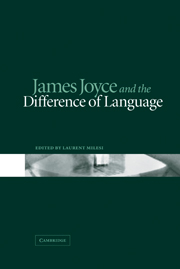Book contents
- Frontmatter
- Contents
- List of contributors
- Acknowledgements
- List of abbreviations
- Chapter 1 Introduction: language(s) with a difference
- Chapter 2 Syntactic glides
- Chapter 3 ‘Cypherjugglers going the highroads’: Joyce and contemporary linguistic theories
- Chapter 4 Madonnas of Modernism
- Chapter 5 Theoretical modelling: Joyce's women on display
- Chapter 6 The lapse and the lap: Joyce with Deleuze
- Chapter 7 ‘sound sense’; or ‘tralala’ / ‘moocow’: Joyce and the anathema of writing
- Chapter 8 Language, sexuality and the remainder in A Portrait of the Artist as a Young Man
- Chapter 9 Border disputes
- Chapter 10 Errors and expectations: the ethics of desire in Finnegans Wake
- Chapter 11 Ex sterco Dantis: Dante's post-Babelian linguistics in the Wake
- Chapter 12 No symbols where none intended: Derrida's war at Finnegans Wake
- Works cited
- Index
Chapter 9 - Border disputes
Published online by Cambridge University Press: 22 September 2009
- Frontmatter
- Contents
- List of contributors
- Acknowledgements
- List of abbreviations
- Chapter 1 Introduction: language(s) with a difference
- Chapter 2 Syntactic glides
- Chapter 3 ‘Cypherjugglers going the highroads’: Joyce and contemporary linguistic theories
- Chapter 4 Madonnas of Modernism
- Chapter 5 Theoretical modelling: Joyce's women on display
- Chapter 6 The lapse and the lap: Joyce with Deleuze
- Chapter 7 ‘sound sense’; or ‘tralala’ / ‘moocow’: Joyce and the anathema of writing
- Chapter 8 Language, sexuality and the remainder in A Portrait of the Artist as a Young Man
- Chapter 9 Border disputes
- Chapter 10 Errors and expectations: the ethics of desire in Finnegans Wake
- Chapter 11 Ex sterco Dantis: Dante's post-Babelian linguistics in the Wake
- Chapter 12 No symbols where none intended: Derrida's war at Finnegans Wake
- Works cited
- Index
Summary
BORDERLINES
James Joyce's Ulysses demonstrates how culture is produced in the act of social survival and as an act of social and political survival. Stephen Dedalus, that ‘embryo philosopher’, argues in the ‘Oxen of the Sun’ episode for the power of the artist's word to invoke forgotten history and the ‘nations of the dead’, as Odysseus calls forth the unnumbered dead to learn their histories and, from Tiresias' shade, to foretell his future: ‘You have spoken of the past and its phantoms […]. Why think of them?’ Stephen asks. ‘If I call them into life across the waters of Lethe will not the poor ghosts troop to my call? Who supposes it? I, Bous Stephanoumenos, bullockbefriending bard, am lord and giver of their life’ (U 14.1295, 14.1112–16; cf. Odyssey, trans. Robert Fitzgerald, XI.36). His claim echoes the Welsh Glendower's boast in Shakespeare's King Henry Ⅳ, Part One: ‘I can call spirits from the vasty deep’, and Hotspur's ironic cut: ‘Why, so can I, or so can any man, / But will they come when you do call for them?’ (Ⅲ.ⅰ.50–2). Can the artist's word prove any more efficacious than a rebel's boast against an imperium that will ‘rebuke’ rebellion, that will not leave the field ‘till all our own be won’ (I Henry IV, V.V.I, 44)? How is the struggle for the historical and ethical right to signify played out in the colonial Ireland of Joyce's Ulysses?
The nationalism of a colonized people, David Lloyd points out,
requires that its history be seen as a series of unnatural ruptures and discontinuities imposed by an alien power while its reconstruction must necessarily pass by way of deliberate artifice. Almost by definition, this anti-colonial nationalism lacks the basis for its representative claims and is forced to invent them. In this respect, nationalism can be said to require an aesthetic politics quite as much as a political aesthetics.
- Type
- Chapter
- Information
- James Joyce and the Difference of Language , pp. 142 - 160Publisher: Cambridge University PressPrint publication year: 2003
- 1
- Cited by



